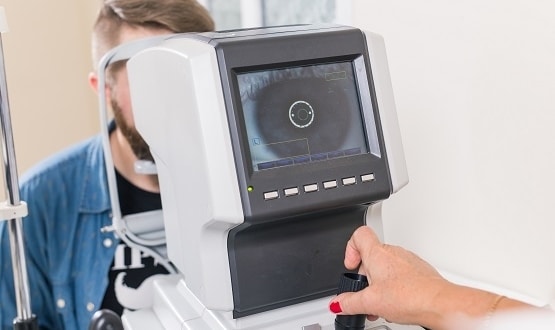A new artificial intelligence system can detect whether patients with an eye condition will develop a more serious form of the disease, researchers have claimed.
In latest research from Moorfields Eye Hospital, in partnership with Google Health and DeepMind, experts claim their AI system can predict whether people with age-related macular degeneration will develop the more serious form of the condition in their ‘good eye’.
A paper, published in the journal Nature, found the system was able to identify positive cases of wet AMD 78% of the time, and identified false positives 56% of the time.
Age-related macular degeneration involves damage to the macula, the central part of the retina at the back of the eye. It causes loss of central vision, affecting the ability to read, drive, watch television, recognise faces, and many other activities of daily living.
The system was trained on datasets of anonymised retinal scans from 2,795 patients with wet AMD, a more serious form of the disease that can lead to blindness.
The datasets contained representations across genders, age ranges and ethnicities, according to a DeepMind blogpost.
The system was shown 3D scans and maps of tissues present in the retina to estimate the patient’s risk of progressing to wet AMD within six months.
“To test the system, we presented the model with a single, de-identified scan and asked it to predict whether there were any signs that indicated the patient would develop wet AMD in the following six months,” a Google Health blogpost states.
“We also asked six clinical experts—three retinal specialists and three optometrists, each with at least ten years’ experience—to do the same.
“Our system performed as well as, and in certain cases better than, these clinicians in predicting wet AMD progression. This highlights its potential use for informing studies in the future to assess or help develop treatments to prevent wet AMD progression.”
The system is still in its early stages and is not yet ready to be implemented in clinical practice.
Pearse Keane, consultant ophthalmologist at Moorfields Eye Hospital, said: “Patients who have lost vision from wet AMD are often particularly worried that their ‘good eye’ will become affected and, as a result, that they will become blind. We hope that this AI system can be used as an early warning system for this condition and thus help preserve sight.
“We are already beginning to think about how this will let us plan clinical trials of preventative therapies – for example, by treating eyes at high risk earlier.
“With this work, we haven’t solved AMD, but we believe we have found another big piece of the puzzle.”
The research follows on from Google Health’s and DeepMind’s previous work with Moorfields in using AI to identify eye disease.

